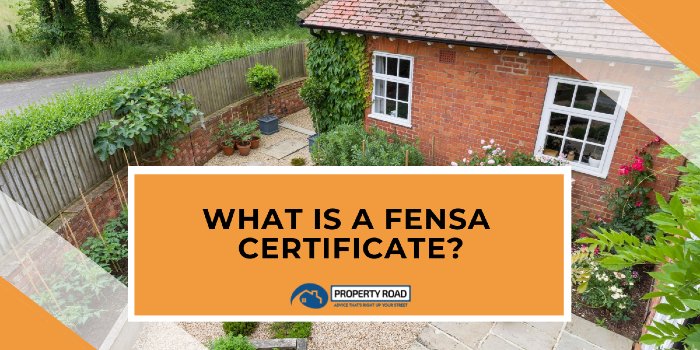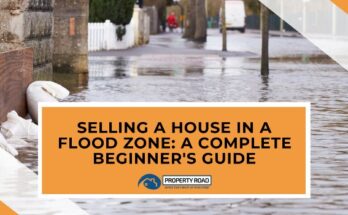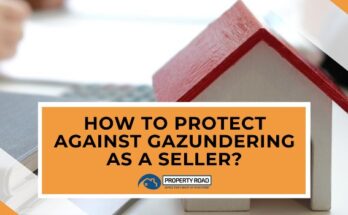Ever wondered ‘what is a FENSA certificate?’ Well, you’re probably not alone.
It would be fair to say that most people don’t know what FENSA is, or that they need a certificate to prove that their replacement windows or doors comply with current Building Regulations.
But if you are selling your home, or thinking about having your windows or doors replaced, then not having a FENSA certificate (or an alternative) could cause you problems down the line.
There are some real issues to consider when it comes to selling without the certification. Such as a potential delay to the process as you’ll have to prove that the replacement doors and windows comply with the regulations.
Or, even worse, you could see a buyer pulling out because you haven’t got the paperwork – especially if your property is in a conservation area.
Here, the PropertyRoad team explains what the FENSA certificate is and why it’s important to have one.
What is a FENSA certificate?

Let’s start with the main question: what is a FENSA certificate? FENSA is the Fenestration Self-Assessment Scheme, which has issued certificates since 2002 to confirm that a replacement window or door installation complies with current Building Regulations.
A FENSA certificate is the evidence you’ll need when selling your home that the work has been completed by a competent installer and that the products used meet the required standards.
To get a FENSA certificate, the installer must be registered with the scheme and the work must be carried out to the required standards.
Once the work is completed, the installer will provide you with a certificate that you can use to prove that the work has been carried out correctly. There’s also an insurance-backed warranty of up to 10 years.
And the installer will also register the work done at the property with the local council, avoiding the need to have a building regulations inspection completed.
Validity of the FENSA certificate
A FENSA certificate will be valid for 10 years from the date of the installation. So if you are selling within 10 years of replacing your doors or windows, you have to provide a copy of the certificate.
If you sell more than 10 years after the installation, the certificate won’t be necessary.
Costs of getting a FENSA certificate
Any FENSA-registered installer should provide you with a certificate after installation at no extra cost. It should be part of the installation.
Should you not get one, don’t be afraid to ask your installer, as they are obliged to provide you one. If they don’t oblige, you can contact FENSA.
If you don’t have a certificate and aren’t sure if you should, you can check on the FENSA website. All you need is your postcode and house number/name. If they have any certificates listed for your house, you can then buy a copy of them.
There are alternatives to FENSA, which we will discuss later.
The importance of having a FENSA certificate

Now that we know what a FENSA certificate is, let’s look at why you should get one. There are several reasons why it’s important to have a FENSA certificate.
Proof of building regulations adherence
Firstly, as proof that the doors and windows were installed according to building regulations. Like other alterations to a house, such as an extension, the work has to adhere to current regulations.
While it can be a pain, this is important, because building regs will ensure that the installation is safe and everything works properly. That’s also in your interest, because you don’t want to find that your new windows are leaking due to a bad installation causing damp issues, for example.
If you live in a conservation area, then building regulations will also stipulate what windows and doors you can install for them to be in keeping with the area. And the local authority could order you to replace them if they don’t.
So by getting a FENSA certificate you can ensure that the installation is done by a competent installer, that building regs have been adhered to and that you won’t have problems down the line.
Quality and warranty
In order for an installer to be registered with FENSA, they have to meet their standards. This means you will get a competent installer who uses high-quality products.
So it’s less likely that you will have issues later. But if you do, then you can claim on their warranty. Every installation of a FENSA window or door comes with a warranty of between 5 and 10 years, depending on the individual installer.
This warranty is insurance backed, this means that even if the tradesman goes out of business during this time, you can still claim directly with FENSA. That’s great for peace of mind, right?
Especially given that replacing windows and doors isn’t cheap, so you want to make sure that if something goes wrong, you’re covered.
When selling the house
As you can see, even if you aren’t planning on selling your home, there are good reasons to get a FENSA certificate. But if you do sell your property, it can be very helpful.
Because you need to have building regs approval for replacement windows and doors, proof of this will be requested as part of the conveyancing process, if you sell within 10 years of the installation.
As part of the TA6 form, which you as a seller have to complete, you’ll be asked if you have replaced any doors or windows in the last 10 years. If you answer yes, you have to provide proof that it was done according to building regulations.
If you can’t provide proof, the buyer’s solicitor will query this and you and your solicitor will have to find a solution. So having a FENSA certificate can make the process run a lot smoother.
It will also assure your buyer, because they know that the work has been carried out by a competent installer and that they are still under warranty.
While not having it won’t stop you from selling the house, it will mean delays and potential extra costs for you. That’s because you might have to get retrospective building regs approval or take out an indemnity insurance.
In rarer cases, the buyer might decide to pull out, especially if their lender insists on proof that the installation was done according to building regs. We will discuss what to do if you don’t have FENSA when selling your house later.
Do I need a FENSA certificate if I’m not selling my property?

As you have seen, getting a FENSA certificate is a good idea, even if you aren’t planning on selling your house. But do you actually need it? The simple answer is no.
However, you should be aware that it’s a legal requirement that windows and doors are replaced according to building regulations. The local authority can ask you to redo the work if the installation isn’t compliant.
This will incur extra costs, which nobody wants, right? But a FENSA certificate isn’t the only way to ensure that the installation has been done according to building regs. There are alternatives, which we will discuss later.
Plus, of course, even if you don’t plan on moving soon, circumstances can change. We know that all too well. We were planning to stay in our last house for a long time.
But things changed, and we moved after 5 years. So better be safe than sorry.
Selling A Property? FREE Step-By-Step Platform
Selling a house without a FENSA certificate

While selling a house without proof of building regs approval, like a FENSA certificate, can be more challenging, it doesn’t mean you can’t sell your house.
There are several scenarios with different solutions.
FENSA certificate lost/not received
The simplest issue to deal with is if there is a certificate, but you don’t have it. Either because you lost/misplaced it or because the installer forgot to give you one.
You can check if there is one, on the FENSA website, as we have already said. If there is, contact your installer and request your copy.
If they are unable to do this, you may need to get in touch with FENSA directly. Worst case scenario is that you have to buy a copy for a relatively small fee.
While it might take a bit of time, it’s still easy to solve.
Installer is non-member/DIY installation
If you have used an installer that isn’t a FENSA member or part of any competent person scheme approved by the government, it gets more complicated.
What should have happened after the completion of the installation is that you or the tradesman got building regulations sign-off. This is done by a visit from a local building inspector who will check the work and then issue a certificate.
If this didn’t happen, you can apply to your local council for a Retrospective Building Regulation Compliance Certificate. This will come with a fee of a few hundred pounds and can take a while to get.
Also keep in mind that you will only get approval if the installation has been done according to building regs. If not, you will have to carry out work to make it compliant.
Alternatively, you could take out indemnity insurance. This will cover any costs incurred if the local authority asks for remedial work to comply with building regulations.
You can only get insurance though, if you haven’t tried to get retrospective building regs approval before. That’s because the insurance won’t cover you if a third party, i.e. the local authority, is aware.
Most buyers will accept this, as long as their lender, if they need a mortgage, does.
On our first house, we did have a window replaced without knowing about FENSA and, as a result, we didn’t get the necessary certificate.
Instead, we were able to pay a few pounds for an indemnity insurance to cover the new owner against any costs of rectifying a non-complying window.
Our solicitor was happy to arrange it all for us. While they did charge us extra for this, the amount was relatively low for the time it saved us. It also gave us confidence that everything had been sorted out properly.
Windows changed as part of bigger project

If you replaced windows or doors as part of a larger refurbishment or building project that required building regulations approval, you probably won’t have a FENSA.
That’s because the completion certificate you received from the council is likely to cover your replacement window(s) or door(s) too.
This was a situation we found ourselves in when we sold our previous property. The buyer’s solicitor was questioning why we didn’t have FENSA certificates for some windows. However, we didn’t have them because they were covered by the loft conversion building regulations approval.
Once we pointed this out and provided them with the copies, they accepted this. Having a good solicitor is key to overcoming any issues during the conveyancing process.
What to look out for when getting new windows and doors

What to check before appointing an installer for your windows and doors:
Make sure they are a FENSA-registered business
Appointing an installer who is registered with FENSA means you will receive a certificate once the work has been completed. To find a FENSA-approved installer, you can search on their website with your postcode.
If a company that quoted for the job tells you they are approved by FENSA, you can check in the same place to make sure. We always check these things, because you don’t want to have issues if they have lied later.
Check the company is registered with the Glass and Glazing Federation (GGF)
When choosing an installer, it’s important to check that they are registered with both FENSA and the Glass and Glazing Federation (GGF).
This will reassure you that they are a reputable company that will carry out the work to a high standard. You should also ask to see examples of their previous work so that you can be sure you are happy with their level of workmanship.
Insist on getting a certificate
After the work has been completed, ask the contractor to provide you with the certificate. Don’t forget that they are obliged to give you one.
If no certificate is forthcoming, then contact FENSA, who should issue a certificate.
When you don’t need a FENSA certificate

Now that we have answered the question ‘what is a FENSA certificate?’ and why it’s important, let’s look at when you don’t need one.
Building regulations regarding windows and doors only apply if you replace them completely. If you are only getting the glass changed or the seal replaced, you don’t need building regs approval.
Basically, for repairs it’s not needed only for complete replacements. This means that you also don’t need or get a FENSA certificate. It’s worth looking at repairing the window or door rather than replacing it.
We found that it’s much cheaper and does the job. In our previous home, the double glazing had failed. We thought we had to replace the window. But the workman we got to quote said that it won’t be necessary.
So he just came and replaced the glass. It didn’t take him very long and wasn’t expensive.
Alternatives to FENSA
As we have already said, a FENSA certificate isn’t the only way to prove that building regs have been met. There are two other main ways:
Certass
This UKAS-accredited body is similar to FENSA. Tradespeople have to register and adhere to their standards.
A Certass-accredited installer is part of the Competent Person Scheme, which means they can self-certify that the work has been carried out according to building regulations. The same as FENSA-registered tradesman.
If you use a Certass-accredited installer, you’ll also get a warranty, which will be insurance-backed. So even if they happen to go out of business, you are still covered.
Certass certificates are acceptable for both building regulation compliance and for the conveyancing process. They can, therefore, be considered to offer an alternative to FENSA.
You can check on the Certass website to find a window fitter that is registered with them. And if you need a copy of the certificate or didn’t get one, you can get in touch with them for help.
Local Authority Building Control

Handy at DIY and fancy doing it yourself? No problem, but you have to adhere to current building regulations and get the work singed off by building control. This will incur a cost of around £120 and £300, depending on the local authority.
If you decide to hire an installer that isn’t a member of FENSA or Certass, then you also have to get your local authority to sign-off on the installation.
So you have to make sure that the installer is competent and will carry out the work according to building regulations.
While it’s illegal to install new windows and doors without adhering to building regs, this doesn’t mean that there are some workmen who won’t do it.
So it pays to make sure that you are absolutely sure about the contractor you intend on hiring.
Both the FENSA and Certass schemes ensure that their tradesmen work to a high standard and use good quality products. With a non-member, you won’t have such a guarantee. And while they might provide a warranty, it might not be insurance-backed.
What is a FENSA certificate?
If you are selling your home, having a FENSA certificate is the easiest way to prove that the installation meets building regs. It also shows a prospective homebuyer that the work was carried out to a high standard and that the warranty on the work is still valid.
That said, there are alternatives to FENSA, which will be equally satisfactory when you come to sell your home. Certass provides you with similar guarantees as FENSA.
Going down the route of getting the local authority to approve the installation works too, but will be more costly, as fees will apply.
Not having proof that the work has been carried out according to building regs isn’t ideal, but won’t stop you from selling your home. You might be a bit more of a challenge, but nothing you can’t overcome.
Nonetheless, we would recommend getting a FENSA certificate if you replace your windows and doors. Not just because it makes it easier when you come to sell, but for peace of mind.





